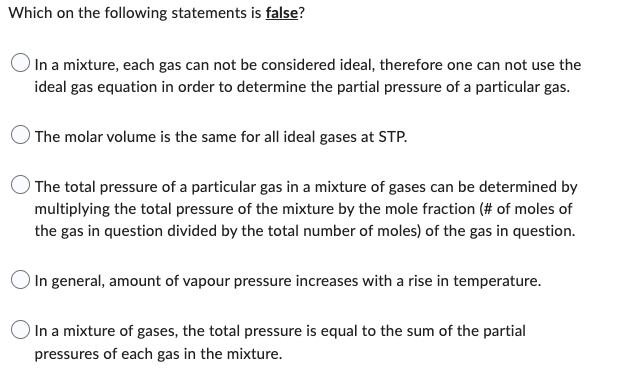Which on the following statements is false? In a mixture, each gas can not be considered ideal, therefore one can not use the ideal gas equation in order to determine the partial pressure of a particular gas. The molar volume is the same for all ideal gases at STP. The total pressure of a particular gas in a mixture of gases can be determined by multiplying the total pressure of the mixture by the mole fraction (# of moles of the gas in question divided by the total number of moles) of the gas in question. In general, amount of vapour pressure increases with a rise in temperature. In a mixture of gases, the total pressure is equal to the sum of the partial pressures of each gas in the mixture.
Which on the following statements is false? In a mixture, each gas can not be considered ideal, therefore one can not use the ideal gas equation in order to determine the partial pressure of a particular gas. The molar volume is the same for all ideal gases at STP. The total pressure of a particular gas in a mixture of gases can be determined by multiplying the total pressure of the mixture by the mole fraction (# of moles of the gas in question divided by the total number of moles) of the gas in question. In general, amount of vapour pressure increases with a rise in temperature. In a mixture of gases, the total pressure is equal to the sum of the partial pressures of each gas in the mixture.
Physical Chemistry
2nd Edition
ISBN:9781133958437
Author:Ball, David W. (david Warren), BAER, Tomas
Publisher:Ball, David W. (david Warren), BAER, Tomas
Chapter1: Gases And The Zeroth Law Of Thermodynamics
Section: Chapter Questions
Problem 1.21E: Pressures of gases in mixtures are referred to as partial pressures and are additive. 1.00 L of He...
Related questions
Question

Transcribed Image Text:Which on the following statements is false?
In a mixture, each gas can not be considered ideal, therefore one can not use the
ideal gas equation in order to determine the partial pressure of a particular gas.
The molar volume is the same for all ideal gases at STP.
The total pressure of a particular gas in a mixture of gases can be determined by
multiplying the total pressure of the mixture by the mole fraction (# of moles of
the gas in question divided by the total number of moles) of the gas in question.
In general, amount of vapour pressure increases with a rise in temperature.
In a mixture of gases, the total pressure is equal to the sum of the partial
pressures of each gas in the mixture.
Expert Solution
This question has been solved!
Explore an expertly crafted, step-by-step solution for a thorough understanding of key concepts.
Step by step
Solved in 2 steps

Knowledge Booster
Learn more about
Need a deep-dive on the concept behind this application? Look no further. Learn more about this topic, chemistry and related others by exploring similar questions and additional content below.Recommended textbooks for you

Physical Chemistry
Chemistry
ISBN:
9781133958437
Author:
Ball, David W. (david Warren), BAER, Tomas
Publisher:
Wadsworth Cengage Learning,

Introductory Chemistry: A Foundation
Chemistry
ISBN:
9781337399425
Author:
Steven S. Zumdahl, Donald J. DeCoste
Publisher:
Cengage Learning

General Chemistry - Standalone book (MindTap Cour…
Chemistry
ISBN:
9781305580343
Author:
Steven D. Gammon, Ebbing, Darrell Ebbing, Steven D., Darrell; Gammon, Darrell Ebbing; Steven D. Gammon, Darrell D.; Gammon, Ebbing; Steven D. Gammon; Darrell
Publisher:
Cengage Learning

Physical Chemistry
Chemistry
ISBN:
9781133958437
Author:
Ball, David W. (david Warren), BAER, Tomas
Publisher:
Wadsworth Cengage Learning,

Introductory Chemistry: A Foundation
Chemistry
ISBN:
9781337399425
Author:
Steven S. Zumdahl, Donald J. DeCoste
Publisher:
Cengage Learning

General Chemistry - Standalone book (MindTap Cour…
Chemistry
ISBN:
9781305580343
Author:
Steven D. Gammon, Ebbing, Darrell Ebbing, Steven D., Darrell; Gammon, Darrell Ebbing; Steven D. Gammon, Darrell D.; Gammon, Ebbing; Steven D. Gammon; Darrell
Publisher:
Cengage Learning

Chemistry: Principles and Reactions
Chemistry
ISBN:
9781305079373
Author:
William L. Masterton, Cecile N. Hurley
Publisher:
Cengage Learning

Chemistry: The Molecular Science
Chemistry
ISBN:
9781285199047
Author:
John W. Moore, Conrad L. Stanitski
Publisher:
Cengage Learning

Introductory Chemistry: An Active Learning Approa…
Chemistry
ISBN:
9781305079250
Author:
Mark S. Cracolice, Ed Peters
Publisher:
Cengage Learning